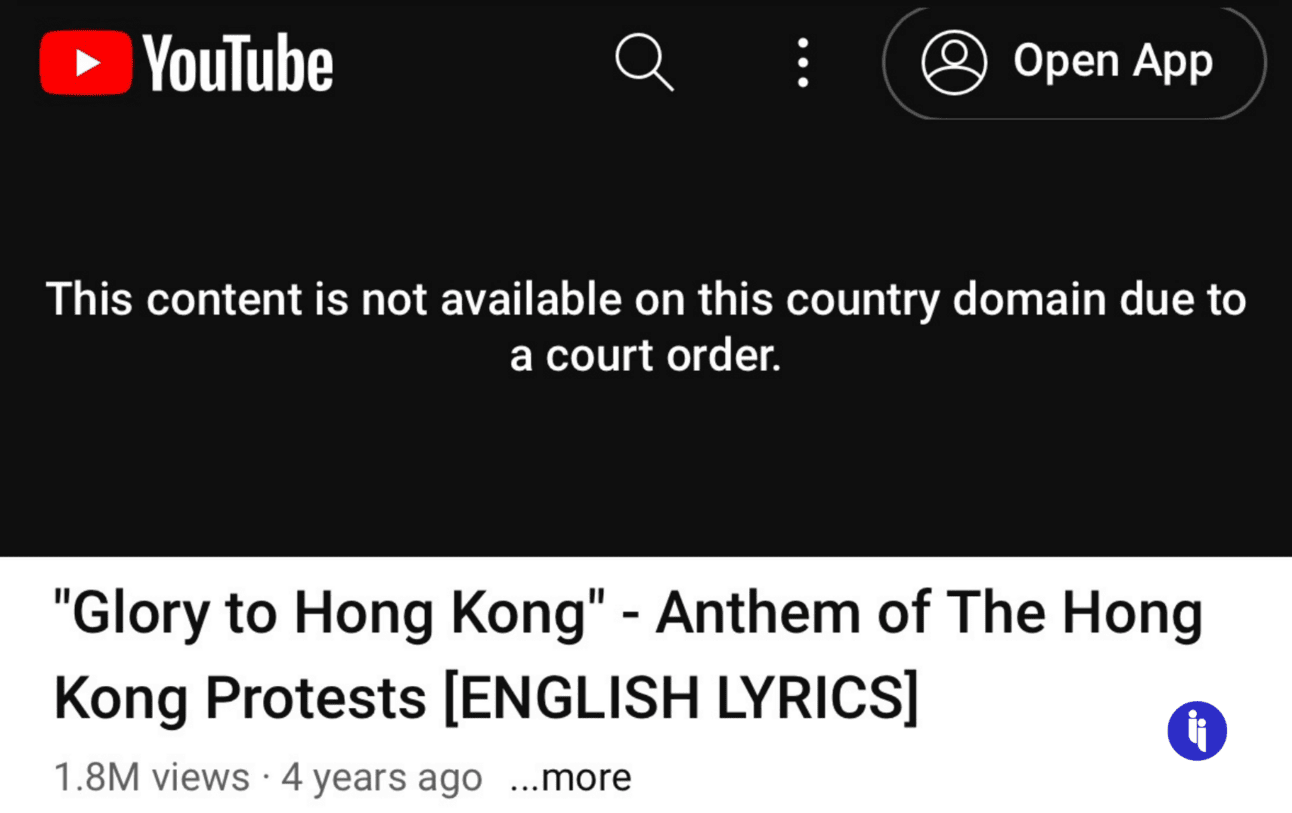US-based video platform YouTube has geo-blocked a protest song in Hong Kong following a court order.
In a statement, the company announced it’s making 32 variations of the song (‘Glory to Hong Kong’) unavailable to its Hong Kong users, while its sister company Google is also blocking related links from popping up in searches.
“We are disappointed by the Court’s decision but are complying with its removal order”, a spokesperson said, adding that YouTube will consider appealing.
Hong Kong authorities first attempted to ban the anthem last year but were shot down by the High Court, which held the ban would have “chilling effects” on free speech. An appeals court then overturned that decision last week, finding that the song could be used as a “weapon” to undermine the city’s stability.
Stay on top of your world from inside your inbox.
Subscribe for free today and receive way much more insights.
Trusted by 99,000+ subscribers
No spam. No noise. Unsubscribe any time.
What’s so special about this song?
Its lyrics include a slogan Hong Kong banned in 2020 (“Liberate Hong Kong, revolution of our times”), in a reference to the Chinese Communist Party’s tightening grip over the city.
An anonymous Hong Kong musician under the pseudonym ‘Thomas dgx yhl’ first wrote and uploaded the original Cantonese version in August 2019. After some tweaks to the lyrics, he then dropped the full music video on Youtube five days later, featuring scenes from the mass protests rocking the city.
And it quickly went viral, going on to become the democracy movement’s unofficial anthem in Hong Kong. In fact, the song became so popular, many folks mistook it for the city’s official anthem (which is actually China’s March of the Volunteers). Organisers even mistakenly played it at the 2022 Asia Rugby Sevens in Korea!
And yet, as emblematic as this YouTube case is, it’s one of many.
- In 2022, Apple removed 1,474 apps from its store at the request of governments, the majority of which came from China (1435), India (14), and Pakistan (10)
- Between 2019 and 2023, Google received 341,490 government removal requests globally, and
- Between October 2022 and April 2023, X/Twitter complied with over 80% of censorship and surveillance requests, a majority of which came from Turkey, Germany and India.
But of course, that’s not to say all requests are the same:
- Last month, Apple took down popular messaging apps like Threads and WhatsApp from China’s Apple store after a request from Beijing
- Also last month, an Australian authority ordered Twitter to remove footage of a stabbing attack, though a court later ruled in the platform’s favour
- In 2019, Facebook complied with Singapore’s ‘fake news law’ by including government statements in two posts criticising the city, and
- Microsoft has reportedly been running a local version of Bing in China since 2009, in compliance with local censorship requirements.
So why is YouTube complying with this latest take-down request?
The technical answer is that if platforms don’t comply, they can face a fine or an outright ban.
But our bigger answer is this: while some companies might be too big to fail, many governments are also too big to ignore.
INTRIGUE’S TAKE
This all exposes some interesting fault lines:
- Governments that try to stamp out specific content risk getting hit by the ‘Streisand effect’ – Hong Kong’s attempt to ban this anthem last year simply drove the song to the top of the charts
- Global tech companies that try to comply with local laws risk tanking their brand (and principles) back home, and
- Hong Kong’s efforts to revive its economy risk being undermined as the world now discusses its decision to ban a song.
And sure, it’s a song now, but what’ll the request be next week? And the week after that? As this all plays out, tech giants don’t have a lot of options, but authoritarians don’t have a lot of care.
Also worth noting:
- At time of writing, the anthem is still available in Hong Kong on other platforms like iTunes and Spotify.
- We caught up with Hong Kong democracy leader Nathan Law last month. From his exile in the UK, he shared his thoughts on where Hong Kong is headed, and what he misses most about home. Our chat with Nate is available to anyone who’s shared Intrigue with two or more friends (using your unique referral code down below).









